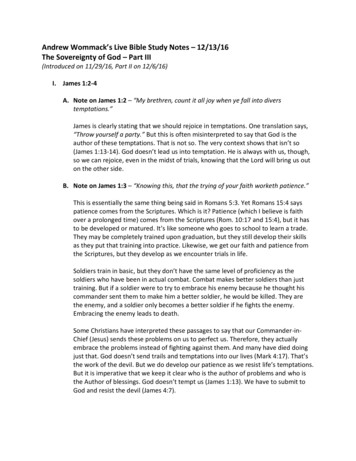
Transcription
Andrew Wommack’s Live Bible Study Notes – 12/13/16The Sovereignty of God – Part III(Introduced on 11/29/16, Part II on 12/6/16)I. James 1:2-4A. Note on James 1:2 – “My brethren, count it all joy when ye fall into diverstemptations.”James is clearly stating that we should rejoice in temptations. One translation says,“Throw yourself a party.” But this is often misinterpreted to say that God is theauthor of these temptations. That is not so. The very context shows that isn’t so(James 1:13-14). God doesn’t lead us into temptation. He is always with us, though,so we can rejoice, even in the midst of trials, knowing that the Lord will bring us outon the other side.B. Note on James 1:3 – “Knowing this, that the trying of your faith worketh patience.”This is essentially the same thing being said in Romans 5:3. Yet Romans 15:4 sayspatience comes from the Scriptures. Which is it? Patience (which I believe is faithover a prolonged time) comes from the Scriptures (Rom. 10:17 and 15:4), but it hasto be developed or matured. It’s like someone who goes to school to learn a trade.They may be completely trained upon graduation, but they still develop their skillsas they put that training into practice. Likewise, we get our faith and patience fromthe Scriptures, but they develop as we encounter trials in life.Soldiers train in basic, but they don’t have the same level of proficiency as thesoldiers who have been in actual combat. Combat makes better soldiers than justtraining. But if a soldier were to try to embrace his enemy because he thought hiscommander sent them to make him a better soldier, he would be killed. They arethe enemy, and a soldier only becomes a better soldier if he fights the enemy.Embracing the enemy leads to death.Some Christians have interpreted these passages to say that our Commander-inChief (Jesus) sends these problems on us to perfect us. Therefore, they actuallyembrace the problems instead of fighting against them. And many have died doingjust that. God doesn’t send trails and temptations into our lives (Mark 4:17). That’sthe work of the devil. But we do develop our patience as we resist life’s temptations.But it is imperative that we keep it clear who is the author of problems and who isthe Author of blessings. God doesn’t tempt us (James 1:13). We have to submit toGod and resist the devil (James 4:7).
C. Note on James 1:4 – “But let patience have her perfect work, that ye may be perfectand entire, wanting nothing.”In other words, we don’t run from the battle just because we are in a tight spot. Ifwe persevere, we will be better off in the long run. Our faith will develop intopatience, and the end results of that will be that we become perfect and complete,wanting nothing.II. James 1:12-14A. Note on James 1:12 – “Blessed is the man that endureth temptation: for when he istried, he shall receive the crown of life, which the Lord hath promised to them thatlove him.”The word endure means different things to different people. Some people definethis as just putting up with a situation. But the Greek word hupomeno that wastranslated “endureth” here means “to stay under (behind), i.e. remain; figuratively,to undergo, i.e. bear (trials), have fortitude, persevere” (Strong’s Concordance). Thisis not a passive word, as some people use the word endure; it is an active wordstressing perseverance. So, this verse is placing a blessing on those who go throughhard times in faith, not those who just put up with problems because there isnothing else to do.Revelation 2:10 promised this same crown of life to those who endured prison andeven death for the sake of the Lord. In that passage, the Lord’s promise was to thosewho were faithful, even unto death. It’s easy to see this isn’t speaking about thosewho were just thrown in prison and rotted there. This is speaking of those whomaintained their faith while they were in prison. It’s speaking again of perseverance.The way we endure hardship is to keep our eyes on Jesus, the Author and Finisher ofour faith.The Greek word peirasmos, which was translated “temptation” in this verse, means“a putting to proof (by experiment (of good), experience (of evil), solicitation,discipline or provocation); by implication, adversity” (Strong’s Concordance). Itcomes from the root word peirazo, and this word means “to test (objectively), i.e.endeavor, scrutinize, entice, discipline” (Strong’s Concordance).B. Note on James 1:13 – “Let no man say when he is tempted, I am tempted of God: forGod cannot be tempted with evil, neither tempteth he any man.”The preceding verses have talked about temptation and the benefits of perseveringthrough them. This is often interpreted that God places these trials on us for
redemptive purposes. But this verse makes it very clear that God is not the author ofthese trials. Trials come, and there is much benefit to be derived from enduringthem in a godly manner. But they do not come from God. Thinking God is the authorof our problems will cause us to submit to them instead of resisting them, and theywill not work to our advantage (James 4:7).See my notes at James 1:2-3.Some might question the accuracy of this statement in light of Genesis 22:1, whichsays that God tempted Abraham. But on closer examination, this verse doesn’t sayGod doesn’t tempt us at all; it says the Lord doesn’t tempt us with evil. The Lorddoes test us as He tested Abraham, but it’s only to bring us to a better place. Henever puts evil on us to hurt us. It’s like an employer who gives an employee a testto see if they can move on to the next level. The Lord is not like an employer whowould test an employee with the idea, “I’ll fire them if they don’t pass.”C. Note on James 1:14 – “But every man is tempted, when he is drawn away of his ownlust, and enticed.”Temptation doesn’t come from without but within. Something from the outsidemight trigger a response, but it’s our own lusts that are the problem. Therefore, ifwe deal with our lusts, we deal with temptation. It’s unrealistic to think that we canlive in a vacuum where there will never be any opportunity to do something wrong.But we can deal with our own hearts to where the lusts have been subdued andtherefore temptation has been made impotent.The New International Version says, “But each one is tempted when, by his own evildesire, he is dragged away and enticed.” The Amplified Bible says, “But every personis tempted when he is drawn away, enticed and baited by his own evil desire (lust,passions).” So, our desires, passions, lust, or emotions is where sin is conceived.III. Romans 5:3-6A. Romans 5:3 – “And not only so, but we glory in tribulations also: knowing thattribulation worketh patience.”Note 7 at Romans 5:3: Paul had just expressed the joy that he had concerning theSecond Coming of Jesus and the glory that would be revealed in us (Rom. 8:18).Anybody can rejoice about heaven, but here Paul began to say that he had thatsame rejoicing in the midst of tribulation. This is something that very few people cansay, and Paul was presenting this as a direct result of justification by faith.When we believe that God loves us because of our faith in Him, and not because ofour performance for Him, then we rejoice—not only in the good times and pleasantthings, like thoughts of heaven, but also in the hard times. Our faith remains
steadfast. However, those who trust in their own efforts will be devastated in timesof trouble because they will know they are getting what they deserve, and they willfeel that they have to clean up their act before they can expect any help. Theirattention will be on self instead of Jesus, the Author and Finisher of their faith (Heb.12:2).Paul continued this same thought on through Romans 5:10. In Romans 5:6-8, heillustrated how great the love of God was for us in that He died for us when we wereungodly. Then he drew a conclusion by way of comparison: If God loved us when wewere His enemies, then how much more does He love us now that we are Hischildren? That’s the reason Paul could rejoice even in tribulation. If God could workin his life to bring him to justification while he was a sinner, then how much more,now that he was reconciled to God, will God work whatever comes against him forhis good!Note 8 at Romans 5:3: People have taken these scriptures to say that God is the onewho brings tribulations to accomplish these positive results in our lives. That is notwhat these scriptures say.Tribulations exist, not because God creates them, but because there is a battlebetween the kingdom of God and the kingdom of the devil. And when we operate infaith, God can grant us such victory that we are actually better off because of thebattle (see note 9 at this verse).It’s just like when an army goes to war. If they win, there are spoils to be gained. Butif those soldiers embraced their enemy because of the spoil they were expecting toreceive, they would be killed instead of blessed. First, they have to fight and win thewar. Then, and only then, will the spoils be available. The enemy doesn’t come to bea blessing, but a blessing can be obtained from the enemy if their opponents arevictorious.Likewise, tribulations and adversities are not blessings from God; they are attacksfrom the Enemy intended to steal away the Word of God from our lives. No oneshould say that the temptation came from God, for God is not the one who temptsanyone (James 1:13). However, there are spoils to be gained when we fight and winover our problems.If problems were what perfected us, then most Christians would have beenperfected long ago and those who experience the greatest problems would be thegreatest Christians; but that’s not the way it is. God’s Word is given to make usperfect and thoroughly furnished unto every good work (2 Tim. 3:17). God’s Worddoes not need to be supplemented with problems to accomplish its work.
This is a pivotal point. Those who believe God has ordained the problems in theirlives to work some redemptive virtue will submit to those problems and therefore toSatan, the author of those problems. They have to or else, in their way of thinking,they would be rebelling against God. Yet James 4:7 tells us to submit ourselves toGod and resist the devil. If Satan can reverse our thinking on this issue and get us tosubmit to the problems he brings into our lives, he’s got us (Rom. 6:16).Paul was simply rejoicing that even in tribulation, he had the opportunity to use, andtherefore strengthen, his patience that had already been given him as a fruit of theSpirit (Gal. 5:22-23) and through the Word of God (Rom. 15:4). And as he believedthat as he stood in patience, he would gain experience that would cause him tohope even more the next time the devil attacked.Likewise, we can rejoice in tribulation, knowing that regardless of what the devildoes, we will win and reap the spoils of victory.Note 9 at Romans 5:3: The word “worketh” was translated from the Greek wordkatergazomai, and that Greek word means “to work fully, i.e. accomplish; byimplication, to finish, fashion” (Strong’s Concordance). Paul was not saying thattribulations produced patience. Patience comes from the Scriptures (Rom. 15:4). Buttribulations cause us to use what God has already given us through His Word, andwe therefore become stronger as a result (see note 8 at this verse).Note 10 at Romans 5:3: According to the American Heritage Dictionary, patiencemeans “the capacity, quality, or fact of being patient.” One definition of patient is“persevering; constant” (AHD). The Greek word used for “patience” here ishupomone, and it means “cheerful (or hopeful) endurance, constancy” (Strong’sConcordance). Patience is not a passive word, as many people use it; it is an activeword.Patience is actually faith—faith that is sustained over a long period of time. Patiencecomes from the Scriptures (Rom. 15:4), just as faith does (Rom. 10:17). Patience is afruit of the Spirit, just like faith (Gal. 5:22-23). It was by faith that Moses endured(the definition of patience, Heb. 11:27). It was through faith and patience thatAbraham received the promises (Heb. 6:12-15), and not just faith, but a faith thatwas constant over a twenty-five-year period of time.Therefore, patience is not just passively waiting on God to do something, but it isactively believing for the manifestation of God’s promise against all odds, regardlessof how long it takes. That kind of faith will make you perfect and complete, notwanting for any good thing (James 1:4).Patience is a byproduct of hope. Romans 8:25 says, “But if we hope for that we seenot, then do we with patience wait for it.” When people have hope firmly
established in them, no obstacle or length of time can keep them from enduring.That’s why the Scriptures produce patience, because they give people hope (Rom.15:4).Therefore, patience, hope, and faith are all intertwined. People can’t have onewithout the others. Those who say they are patiently waiting on God yet have losttheir hope are deceived. Likewise, those who don’t believe God are not operating inpatience. First comes hope from a promise of God’s Word. Then faith begins to givesubstance and evidence to those things that were hoped for (Heb. 11:1). And if timeis involved before the manifestation comes, then patience does its work (James 1:4).B. Note on Romans 5:4 – “And patience, experience; and experience, hope.”Note 11 at Romans 5:4: The Greek word used for “experience” here is dokime, and itmeans “approved character; the quality of being approved as a result of test andtrials” (Linguistic Key to the Greek New Testament by Fritz Rienecker). Sanday andHeadlam also defined this word in this verse as “the temper of the veteran asopposed to that of the raw recruit.” Therefore, this verse is speaking of thecharacter that is produced as a result of having fought battles and won.Note 12 at Romans 5:4: Hope by itself will never give people victory. Many peoplehave hoped for things and yet have never realized those hopes because they nevermoved into faith. Faith is the victory that causes people to overcome the world (1John 5:4), yet faith won’t work without hope.Just as a thermostat activates the power unit on an air conditioner, so hope is whatactivates our faith. Faith only produces what we hope for (Heb. 11:1). Therefore,hope is the first step toward faith.The word hope means “a desire accompanied by confident expectation” (AmericanHeritage Dictionary), so desiring the things of God with some expectation ofobtaining them is the first step in walking in faith. Once this hope is present, thenfaith begins to bring the desired thing into manifestation. If a delay is encountered,patience completes the work (see note 10 at Rom. 5:3).In context, Paul was saying that our experience “worketh” (see note 9 at Rom. 5:3)hope. However, he also said in this same epistle (Rom. 15:4) that hope comesthrough the Scriptures. Therefore, it is to be understood that the character that isdeveloped through tribulations just adds to the hope that we have already receivedthrough God’s Word.Hope is a positive imagination. Hope is the thermostat that controls faith.
C. Note on Romans 5:5 – “And hope maketh not ashamed; because the love of God isshed abroad in our hearts by the Holy Ghost which is given unto us.”Galatians 5:6 says faith works by love, but this verse reveals that hope works by lovealso. God’s great love for us is the motivation for faith and hope. It causes us to befilled with all the fullness of God (Eph. 3:19).D. Note on Romans 5:6 – “For when we were yet without strength, in due time Christdied for the ungodly.”Life for Today Study Bible NotesNote 13 at Romans 5:6: Notice the terms that Paul used to describe us before thetransformation of the new birth. We were weak (this verse), ungodly (this verse),sinners (Rom. 5:8), and enemies (Rom. 5:10). The Lord didn’t save us because wedeserved it; it was an act of grace.As great as this truth is, Paul didn’t stop here. He continued on to make acomparison that if God loved us enough to die for us when we were weak, ungodly,sinners, and enemies, then much more now that we are justified (Rom. 5:9) andreconciled (Rom. 5:10) is He willing to save us in spite of our actions.IV. Romans 8:26-29A. Note on Romans 8:26 – “Likewise the Spirit also helpeth our infirmities: for we knownot what we should pray for as we ought: but the Spirit itself maketh intercession forus with groanings which cannot be uttered.”The Greek word that was translated “helpeth” in this verse is sunantilambanomai,and it means “to take hold of opposite together, i.e. co-operate (assist)” (Strong’sConcordance). This means the Holy Spirit doesn’t do this for us but with us.Many people have said that this groaning is speaking in tongues. But speaking intongues can be uttered. This is speaking of a groaning in the spirit that is differentthan speaking in tongues. The Greek word alaletos, which was translated “whichcannot be uttered” in this verse, means “unspeakable” (Strong’s Concordance). Thisis clearly referring to something other than speaking in tongues.Life for Today Study Bible NotesNote 1 at Romans 8:26: The word “likewise” is stressing that in the same way thathope helps us endure until the redemption of our bodies (Rom. 8:23), so the HolySpirit helps us through the frailties of our flesh by interceding for us.
Note 2 at Romans 8:26: The word “helpeth” was translated from the Greek wordsunantilambanomai, and it means “to take hold of opposite together, i.e. co-operate(assist)” (Strong’s Concordance). It describes a union, not the Holy Spirit doing all theinterceding for us. The Holy Spirit helps us as we are interceding, but He doesn’tautomatically do it for us.Note 3 at Romans 8:26: The Greek word that was translated “infirmities” in thisverse is astheneia, and it means “feebleness (of mind or body); by implication,malady; morally, frailty” (Strong’s Concordance). This same word was translated“weakness” five times (1 Cor. 2:3, 15:43; 2 Cor. 12:9, 13:4; and Heb. 11:34), so it iseasy to see that this word is describing mental and moral weakness, not sickness.Paul went on to describe what these infirmities are when he said, “For we know notwhat we should pray for as we ought.” The infirmities this scripture is speaking ofare the weaknesses that come from not knowing how we should pray.Note 4 at Romans 8:26: This has been an encouraging scripture for countlessbelievers. It is certain that none of us knows exactly how to pray in every situation.Therefore, it is very comforting to know that the Holy Spirit is there to help us.However, as mentioned in note 2 at this verse, He helps us; He doesn’t do theinterceding for us but through us.Even Jesus drew on this ministry of the Holy Spirit. It is written in John 11:33 and 38that Jesus groaned in the Spirit twice when He raised Lazarus from the dead. Whatinfirmity did Jesus have that He needed this ministry of the Holy Spirit? Jesus had nosin, but He did have an infirmity—His physical mind. Even a sinless human mindcould not comprehend raising a man from the grave after four days.If Jesus needed the Holy Spirit to help Him when He didn’t know how to pray, thencertainly this should be an important ministry of the Holy Spirit in our lives.Note 5 at Romans 8:26: This intercession of the Holy Spirit is with “groanings whichcannot be uttered.” Some Spirit-filled Christians have said that this means groaningthat cannot be uttered in our normal speech and therefore have said this is referringto speaking in tongues. Yet this is referring to an intercession that is different fromspeaking in tongues.In John 11:33 and 38, Jesus groaned in the Spirit twice. This is the exact terminologythat is used here in Romans 8:26, and in John 11, it is easy to see that no words wereuttered. It was exactly as the Scripture states: a groaning in the Spirit.All those who have the indwelling presence of the Holy Spirit have or will have thishappen to them. Paul was referring to this in Galatians 4:19 when he spoke oftravailing in birth for the Galatians. This groaning of the Holy Spirit is not just of grief
but a groan of anger and resistance against Satan’s devices in people’s lives. Manytimes Christians don’t discern this, because they think they are the only ones grievedwith their situations. But this is the Holy Spirit desiring to get into intercession withpeople against their problems.Although the groaning is unutterable, it can be discerned, and many times peoplereact to this with audible groans or other outward acts. This has led to religiousdoctrines and traditions that are offensive to many people and are unscriptural.There is nothing wrong with people reacting to the inner working of the Holy Spiritas long as they don’t confuse their reactions with the Holy Spirit’s actions. Thisintercession cannot be uttered.Any counterfeits that religion may have produced only serve to illustrate that therehas to be a genuine. The genuine groaning in the Spirit is priceless.Jesus groaned in the Spirit twice before He raised Lazarus from the dead.B. Note on Romans 8:27 – “And he that searcheth the hearts knoweth what is the mindof the Spirit, because he maketh intercession for the saints according to the will ofGod.”“He that searcheth the hearts” is speaking of God the Father, and He knowsperfectly well what the Holy Spirit is communicating. The Holy Spirit is alwaysleading us and interceding with us for God’s perfect will to come to pass in our lives.We don’t always say things correctly, but when we intercede, the Holy Spirittranslates our hearts’ cry to the Father. The Father and the Holy Spirit communicateperfectly.Life for Today Study Bible NotesNote 6 at Romans 8:27: “He that searcheth the hearts” is a reference to God. Godknows our hearts, and He knows that the Holy Spirit will only intercede for the willof God to be done. The Holy Spirit is never at a loss as to how to convey our needs tothe Father, as we sometimes are. That’s the reason this ministry of the Holy Spirit isso important. There is such oneness between the Father and the Holy Spirit thateven His groanings are perfectly understood.C. Note on Romans 8:28 – “And we know that all things work together for good tothem that love God, to them who are the called according to his purpose.”This is one of the most abused verses in the Bible. Many people have quoted this tosay that whatever happens to us works out for our good. Observation can easilyreveal that is not the case.
First of all, this verse begins with the conjunction “And.” This means everything thatis being said here is dependent on the previous verse about the Holy Spirit makingintercessions together with us. If we are not letting the Holy Spirit help us withintercession, then all things do not work together for good.Second, notice that this verse does not say that all things come from God, as it isoften quoted. It is simply saying that if we are interceding in the power of the HolySpirit, then we can take whatever the devil throws at us and make it work togetherfor our good. That is a huge difference. If people interpret this verse to say thatwhatever comes our way is from God, then it makes them yield to their problemsand removes them from the deliverance available through Christ (James 4:7).Notice also that this only works for those who love God. That’s not everyone. And italso only works for those who are the called according to His purpose. First John 3:8says, “For this purpose the Son of God was manifested, that he might destroy theworks of the devil.” Those who are not resisting the problem but submit to theproblem are not operating in the same calling that Jesus did.So, whatever comes our way only works together for our good if we are intercedingin the power of the Holy Spirit, if we love God, and if we are out to destroy theworks of the devil. Those are big ifs that people who submit to problems as beingGod’s will do not overcome.Life for Today Study Bible NotesNote 7 at Romans 8:28: This is a very powerful verse with a wonderful promise, butit has been greatly abused and misapplied. This verse is not saying that everythingthat happens to us is from God and is used by Him to accomplish His purposes in ourlives. The Bible doesn’t teach that.Second Peter 3:9 makes a clear statement that the Lord is “not willing that anyshould perish, but that all should come to repentance.” However, many men andwomen are perishing, because they have a choice. So, regarding salvation, God’s willis not being done in the lives of many people.Concerning physical healing, the Bible states that Jesus has already provided healingfor us (Is. 53:5) and that it is God’s will for us to be healed (3 John 2). Yet not all of usare healed, and our sicknesses are not automatically working some redemptivepurpose in our lives.Romans 8:28 begins with the word “and.” This means that the statement abouteverything working together for our good was made after Paul had spoken of theHoly Spirit making intercession for us. If we are not cooperating with the Holy Spiritso that He can make intercession for us (see note 4 at Rom. 8:26), then everythingwill not work together for our good.
This verse also says this happens for those “that love God, to them who are thecalled.” That means this doesn’t apply to everyone. However, this verse has beenused to try to convince even unbelievers that God is controlling the circumstances oftheir lives. That is not the message of this verse.Also, this verse does not say that everything that comes our way is from God butrather that the Lord can work it together for our good through the intercession ofthe Holy Spirit. Romans 6:16 clearly states that if we yield to the devil, we becomehis slaves. The false teaching that nothing happens to us but what God wills orallows has caused many of us to yield to Satan’s bondage instead of resisting him(James 4:7).People may cite experiences where they learned great lessons through tragedy andargue that these negative experiences are the only way the Lord could haveaccomplished His will in their lives. Again, that is not what the Bible teaches.Second Timothy 3:16-17 says, “All scripture is given by inspiration of God, and isprofitable for doctrine, for reproof, for correction, for instruction in righteousness:That the man of God may be perfect, throughly furnished unto all good works.”Second Timothy 3:17 says that God’s Word will make us perfect, thoroughlyfurnished unto all good works. That means we don’t have to learn throughhardships. God’s Word is for correction and reproof.Although not ordained by God for their good, people will experience tribulation.Therefore, they can and should learn from trials, but God’s Word could have taughtthem the same thing with less grief. Those who submit to their problems becausethey believe God has brought them to teach them something are making a greatmistake. That mistake is allowing the devil to inflict much pain in their lives.Romans 8:28 is really promising that when we let the Holy Spirit intercede throughus with these groanings that cannot be uttered, we can rest assured that regardlessof what the devil brings across our path, God can turn that situation around andwork it together for our good.D. Note on Romans 8:29 – “For whom he did foreknow, he also did predestinate to beconformed to the image of his Son, that he might be the firstborn among manybrethren.”This verse is the key to predestination (1 Pet. 1:2). God only predestinates those whoHe foreknew would accept Him. He has never predestinated anyone to hell. ThoseHe knew would accept Him as Savior are predestinated to become just like Jesus. Aswe renew our minds, this can happen to a degree in this life, but every true believerwill be exactly like Jesus when we see Him (1 John 3:1-2).
Life for Today Study Bible NotesNote 1 at Romans 8:29: The word “foreknowledge” refers to God knowing whowould accept His offer of salvation in advance of them actually doing it. TheScriptures teach that we (believers) were chosen in Christ before the foundation ofthe world (Eph. 1:4). That’s how infinite God’s ability is to know our choices inadvance.The Scriptures also reveal that there are some things God does not know. Twice inthe book of Jeremiah, God said the fact that people would offer their children assacrifices to demon gods never even came into His mind (Jer. 19:5 and 32:35). Thereare some things that God Himself said He had never foreseen.It is most probable that the Lord has the ability to know everything in advance, butHe simply doesn’t choose to exercise that ability in every situation. He told us to bewise concerning that which is good, and simple (or innocent) concerning that whichis evil (Rom. 16:19). He also told us to think on things that are true, honest, just,pure, lovely, of good report, and things that have virtue and praise (Phil. 4:8). That’sthe way He desires us to be because that’s the way He is.Therefore, when God acted surprised that Adam and Eve had eaten of the forbiddentree, He probably was. As we have already pointed out from Ephesians 1:4, Godchose us in Christ before the foundation of the world. He knew there would be atransgression and a need for redemption before man was even created. Butapparently, He did not utilize His foreknowledge to the extent that He knew everymove that man was making. No reason is given for this, but certainly one reason isthat an absolute use of God’s foreknowledge would hinder His relationship withman.God sent two angels to Sodom and Gomorrah to see if their actions were really asbad as had been reported to Him (Gen. 18:20-19:29). The Lord tested Abraham(Gen. 22:1-10). After the test, He said, “For now I know that thou fearest God, seeingthou hast not withheld thy son, thine only son from me” (Gen. 22:12). The Lordrepented for choosing Saul to be king when He saw the way he turned out (1 Sam.15:11). The Scripture contains many other examples besides these.God’s ability
Andrew Wommack's Live Bible Study Notes - 12/13/16 The Sovereignty of God - Part III (Introduced on 11/29/16, Part II on 12/6/16) I. James 1:2-4 A. Note on James 1:2 - "My brethren, count it all joy when ye fall into divers temptations." James is clearly stating that we should rejoice in temptations. One translation says,










